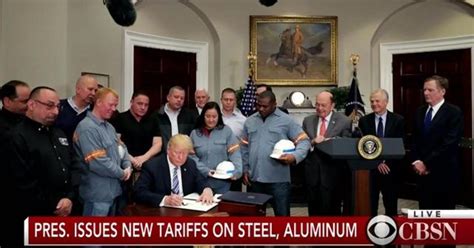President Donald Trump’s latest tariff announcement, dubbed “Liberation Day,” has sparked interest in a web3 startup that claims it can revolutionize how tariffs are tracked using blockchain technology. The startup, Watr, is not just another bold claimant in the web3 space; it boasts credibility with its platform already being utilized by large mining companies and auto manufacturers to validate commodities.
Headed by Maryam Ayati, a seasoned executive with experience at Shell, BP, and JP Morgan, Watr aims to bring transparency and efficiency to global trade processes. With investments from crypto VCs and industry executives, the company has garnered substantial financial backing to support its ambitious goals.
“We will also soon be able to augment reported data with machine-sourced data… watching to see where commodities have come from…”
Ayati envisions a future where commodities can be pre-checked for tariffs even before transactions occur, preventing potential discrepancies in trade routes that could lead to significant financial gains for some traders. This proactive approach aligns with efforts to streamline global trade operations amid tariff uncertainties.
The global commodities market, valued at $20 trillion, stands as a pivotal arena for Watr’s disruptive technology. By leveraging blockchain tools such as decentralized IDs and digital fingerprints, the platform aims to modernize economic infrastructure fundamentally.
“This isn’t about token hype. It’s about transforming how trust, traceability, and liquidity work in the real world.”
Watr’s journey began in 2022 with a focus on tracking commodity provenance through regulatory compliance like CO2 emissions and ESG factors. However, recognizing shifting industry priorities away from ESG towards sanctions and tariffs oversight brought about by geopolitical dynamics led Watr to pivot its strategy accordingly.
The recent announcement of Watr migrating to the Avalanche blockchain network signifies a strategic move towards enhancing scalability tailored specifically for managing commodities within global supply chains. The utilization of Avalanche’s technology underscores an intentional effort by Watr to address industry-specific needs effectively.
While previous attempts at integrating blockchain into commodities trading have shown promise but limited success outside of isolated initiatives like IBM’s collaboration with “The Seam” or komgo initiative supported by major players including ING and Shell—the key lies in sustained adoption beyond pilot stages.
“If Watr can truly bring pre-trade tariff validation ‘onchain’… this could mark a serious inflection point for blockchain adoption in global trade.”
Expert voices like Keld van Schreven highlight the significance of Watr’s endeavor in setting a potential benchmark for broader blockchain adoption within the global trade landscape. The emphasis on testing market viability underscores the pragmatic approach required for transformative technologies like those offered by Watr.

